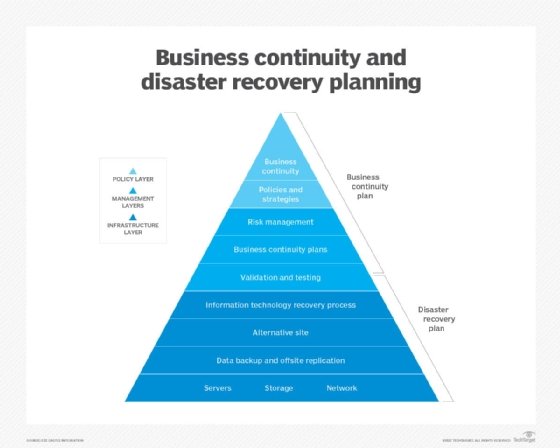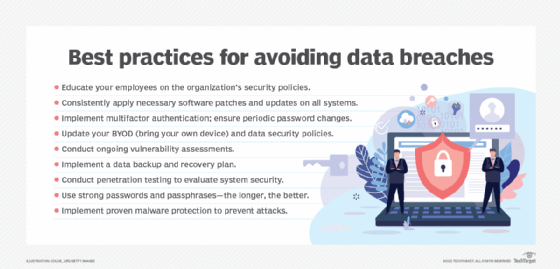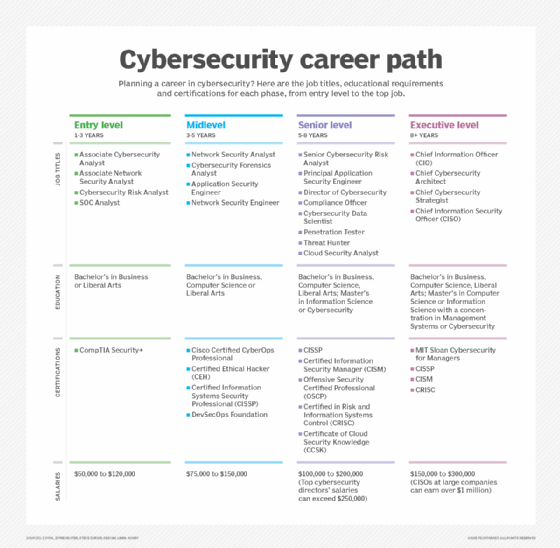What is information security (infosec)?
Information security (infosec) is a set of policies, procedures and principles for safeguarding digital data and other kinds of information. It involves the processes and tools designed and deployed to protect sensitive business information from modification, disruption, destruction and unauthorized inspection.
Infosec responsibilities include establishing a set of business processes that protect information assets, regardless of how that information is formatted or whether it is in transit, being processed or at rest in storage. Generally, an organization applies information security to guard digital information as part of an overall cybersecurity program. Infosec ensures that the employees have access to the data they require, while preventing unauthorized access. It's also be associated with risk management and legal regulations.
Why is infosec important?
Information security plays a vital role in protecting an organization's most critical asset, which is its data. Inadequate security measures can expose businesses to serious risks such as financial loss, reputational damage, regulatory fines and even the breakdown of essential operations.
The following points highlight why information security is essential for organizations:
- Protects sensitive information. Information security protects sensitive information for organizations, including customer records, employee details, confidential business information and trade secrets. It also protects data vital to critical infrastructure, such as power grids. Without strong information security measures, crucial information is vulnerable to unauthorized access, theft, malicious alteration and destruction. This poses risks to both individuals and organizations.
- Prevents financial losses. Cyberattacks, such as ransomware, phishing and data breaches, can cost millions in recovery efforts, legal fees, lost business and regulatory fines. An effective infosec program helps prevent or reduce the effects of such incidents.
- Ensures business continuity and operational resilience. Information security is essential for maintaining business continuity and operational resilience. Cyberattacks and security incidents can cause disruptions that result in extended downtime and substantial financial losses. By adopting strong information security practices, such as incident response strategies and disaster recovery protocols, organizations can quickly identify, contain and recover from attacks.
- Maintains trust and reputation. Information security is crucial for maintaining the trust and reputation of an organization. A data breach or security incident can damage an organization's public image and erode customer confidence, leading to customer churn and negative media coverage. This loss of trust can also undermine investor confidence, potentially causing a decline in market value and long-term brand damage. By implementing strong infosec practices, companies demonstrate their commitment to safeguarding their data against unauthorized access, misuse and cyberthreats.
- Enables regulatory compliance. Many industries are governed by laws, such as the Health Insurance Portability and Accountability Act (HIPAA), General Data Protection Regulation (GDPR), and Sarbanes-Oxley Act. Noncompliance can result in fines, legal actions and lawsuits. Information security helps organizations meet legal and regulatory requirements by proactively ensuring compliance with complex data protection laws and standards.
- Defends against threats. Cyberthreats range from insider threats to sophisticated advanced persistent threats (APTs). Information security programs defend against these attack vectors by offering a structured approach to identifying, evaluating and managing these risks effectively.
Principles of information security
The pillars or principles of infosec are collectively known as the confidentiality-integrity-availability (CIA) triad. These are intended to serve as a guide for information security policies and processes within an organization. The overall goal of infosec is to let the good guys in, while keeping the bad guys out. The three primary tenants to support this are confidentiality, integrity and availability:
- Confidentiality. This principle requires that information be available only to those with the proper authorization to access that data.
- Integrity. This principle dictates that information is consistent, accurate and trustworthy.
- Availability. This principle mandates that information is easily accessible to those with proper authorization and remains so in case of failure to minimize interruptions to users.
These three principles don't exist in isolation but inform and affect one another. Therefore, any infosec system involves a balance of these factors. As an extreme example, information only available as a written sheet of paper stored in a vault is confidential but not easily available. Information carved into stone displayed in the lobby has a lot of integrity, but it isn't confidential or available.
Other infosec principles
While the CIA triad forms the basis of infosec policy and decision-making, other factors, including the following, should be added to a complete infosec plan:
- Risk management. Because infosec involves a balance of competing factors, it is associated with risk management. The goal here is to maximize positive outcomes, while minimizing negative ones. Organizations use risk management principles to determine the level of risk they are willing to take on when executing a system. They can also put safeguards and mitigations in place to reduce risk.
- Data classification. Along with infosec, data classification should be considered to give extra attention to information that needs to remain either highly confidential or easily available.
- Media and confidentiality agreements. Information security isn't limited to digital data and computer systems. A full infosec policy covers physical information, printed information and other kinds of media. It might also include confidentiality agreements.
- User training. Businesses should also employ user training to protect personal data, as well as both computer controls and organizational policy as risk mitigation factors. For example, to limit the risk of an accounting analyst changing financial data, an organization can put in place a technical control limiting change rights and logging changes. Alternatively, an organizational policy of having a second person audit completed records can also mitigate this risk.
- Nonrepudiation. Another important infosec factor is nonrepudiation, which is the ability to prove that information hasn't been tampered with. No one should tamper with data at rest or in transit, its source should be trustworthy, and it shouldn't be accidentally or maliciously modified.
- Business continuity and disaster recovery. BCDR is an additional consideration of infosec. Data should remain available and unchanged in the case of a software or hardware failure. Organizations can accomplish this through backups or redundant systems.
- Change management. Consider change management with an infosec policy as well. Poorly managed changes can cause outages that affect the availability of a system. System changes also affect the overall security of stored data.
- Local laws and governmental regulations. Regulatory bodies often regulate personally identifiable information depending on the region. Regulations, such as HIPAA for medical data, the Payment Card Industry Data Security Standard (PCI DSS) for payment information or the European Union's (EU) GDPR legislation, require that some information be treated differently or have special security controls in place.
Least privilege. Strong information security requires that users and systems are granted only the minimum level of access required to perform their tasks. This enforces the principle of least privilege, reducing the attack surface and limiting potential damage if credentials are compromised.

Types of information security
Although information security can take many different forms, the following are the most common types:
- Application security. This infosec approach is designed for safeguarding applications and application programming interfaces. It stops and blocks vulnerabilities and data breaches from affecting applications. Application security can be achieved through various techniques, such as using web application firewalls and scanners that continuously find, monitor and mitigate vulnerabilities.
- Infrastructure security. Infrastructure security focuses on safeguarding intranet and extranet networks, as well as labs, data centers, servers, desktop computers, cloud assets and mobile devices. It also protects against typical cybercrimes, as well as natural disasters and other mishaps. In short, infrastructure security plays a big part in reducing and mitigating damage from any type of malfunction.
- Cloud security. This approach is geared toward securing, building and hosting apps in the cloud. To ensure cloud security, businesses must ensure secure application use and isolation between separate processes because cloud applications are run in a shared environment.
- Cryptography. This is the process of converting plaintext data into secure data by encrypting it. Cryptography encrypts both data at rest and in transit to ensure data integrity and defend against cyberattacks. To make messages and data harder to read, security teams frequently use digital signatures and sophisticated algorithms. For instance, symmetric key algorithms, such as Advanced Encryption Standard, are frequently used to secure sensitive government data.
- Vulnerability management. Every year, thousands of new vulnerabilities are discovered that require organizations to patch their operating systems and applications and reconfigure the security settings of their network. The vulnerability management process identifies and manages all the weak points in an environment to proactively address vulnerabilities before they turn into real threats.
- Incident response plan. An incident response plan is a set of information security processes that are used to identify, contain and recover from security breaches. By having an incident response strategy in place, organizations can contain threats and recover easily from the aftermath of a security incident. Steps for preserving evidence for forensic examination and future prosecution should also be established as part of this plan. These details can be used to identify the perpetrator and prevent subsequent attacks.
- Identity and access management. IAM is a comprehensive framework of policies, processes and technologies designed to manage digital identities and regulate user access to resources. It encompasses the creation and administration of unique digital identities and the authentication of those identities via credentials such as passwords, multifactor authentication or biometrics. It also includes the authorization of permissions based on roles or attributes. By combining identity proofing, credential management, access control and auditing, IAM ensures that only verified and authorized users and systems can access specific resources at the appropriate times.
- Operational security. This involves implementing and maintaining secure processes and decision-making practices related to data handling and protection. It includes activities such as securely disposing of devices, managing third-party or vendor risks and ensuring that day-to-day operations don't inadvertently expose sensitive information.
- Physical security. While often overlooked in the digital age, physical security is a foundational component of infosec. It involves safeguarding physical assets that support information systems, such as data centers, server rooms and hardware, from unauthorized access, theft, damage and environmental threats. Measures include access control systems, such as keycards, biometrics, surveillance cameras, security guards and environmental controls.

Information security threats
Threats to information security manifest themselves in a variety of ways. The following are the most common threat vectors:
- Insecure systems. New technology is being released every day. However, if it's not designed with security in mind, it can have severe repercussions for the information security of an organization. Consequently, if a business is running obsolete or legacy systems, it runs a great risk of falling prey to security breaches. Organizations should identify weak systems and patch them up or decommission them as necessary.
- Social media attacks. Attacks on information security through social media are on the rise. On Oct. 7, 2022, Facebook's parent company, Meta, announced its researchers had found 400 malicious Android and iOS apps during the previous year that were intended to steal Facebook users' usernames and passwords and compromise their accounts. Cybercriminals use direct or indirect means to attack social media sites. Through messaging, attackers can often transfer malware to social media users who are the targets of direct attacks. Indirect techniques involve gathering data from social media sites to identify organizational or user vulnerabilities and plan an attack.
- Social engineering attacks. Social engineering is the practice of coercing individuals into disclosing or stealing their personal information. This tactic relies on exploiting human nature, which is typically the weakest link in a system. Attackers typically send phishing emails and messages that have a tone of urgency or fear, tricking users into divulging their sensitive information.
- Third-party breaches. Attackers occasionally use a flaw or vulnerability to gain access to and steal data held on the systems of third-party vendors. For instance, in 2021, hackers exploited the vulnerabilities in Microsoft Exchange Server to access the emails of 60,000 private companies and nine government entities.
- Attacks on sensitive information. Encryptionnis a great way to protect information assets within an organization. For example, the healthcare industry follows HIPAA compliance, which requires every computer to be encrypted due to the sensitive nature of the data involved. However, this important method is often overlooked due to its complex nature and lack of legal implications.
- AI-driven and automated attacks. Cybercriminals are increasingly using AI and automation to scale their attacks, making cyberthreats more pervasive and dynamic. According to a Fortinet report, AI-powered automated scanning surged to an astonishing 36,000 scans per second in 2024, which is a 16.7% annual increase. This let attackers identify vulnerabilities at an unprecedented pace. Threat actors also use AI to craft highly personalized phishing messages, develop adaptive malware and even deploy autonomous attacks that execute multistage exploits with minimal human intervention.
- Zero-day exploits. These exploits are security vulnerabilities in software that are unknown to the vendor and exploited by attackers before a fix is available. Because Zero-day exploits haven't been patched or publicly disclosed, they're a serious threat to information security as they give cybercriminals a window of opportunity to launch stealthy and often targeted attacks. These exploits are difficult to detect, making them a favorite tool for APTs and nation-state actors.
- Cloud security gaps. Cloud security gaps arise when cloud environments are misconfigured, poorly monitored or lack strong identity and access controls. These vulnerabilities expose sensitive data to potential breaches. As organizations adopt hybrid and multi-cloud architectures, visibility and governance often become fragmented, increasing the risk of unauthorized access or accidental data leaks. Weak permission structures, excessive entitlements and overlooked assets all contribute to these vulnerabilities.
- Human error. Beyond malicious attacks, information security is also threatened by human factors, which include unintentional mistakes, negligence and a lack of security awareness among individuals, leading to vulnerabilities such as misconfigured systems, accidental data disclosures and the use of weak passwords.
Information security tools
Information security relies on a strong set of tools, platforms and technologies designed to detect, prevent, respond to and recover from threats.
The following are some of the key security tools across the infosec ecosystem:
- Firewalls. These act as a barrier between trusted internal networks and untrusted external networks, such as the internet. They control incoming and outgoing network traffic based on predefined security rules.
- Next-generation firewalls. NGFWs go beyond traditional firewalls with features including deep packet inspection, application awareness and threat intelligence integration.
- Intrusion detection systems and intrusion prevention systems. IDS monitors network or system activities for malicious activity or policy violations and alerts administrators. IPS not only detects but also actively blocks or prevents detected threats from reaching their targets.
- Virtual private networks. VPNs are used to create a secure, encrypted connection over a less secure network, such as the internet. This ensures remote users can securely access corporate resources.
- Security information and event management. SIEM tools collect and aggregate log data from various security devices and systems across an organization. In doing this, they provide centralized monitoring, correlation of events and real-time alerts.
- Cryptography. This approach uses algorithms to transform information into an unreadable format, ensuring that only authorized individuals possessing the correct decryption key can access and comprehend its content.
- Endpoint detection and response. EDR tools continuously monitor endpoint activities, collect data and use analytics to detect and investigate suspicious behaviors, enabling rapid response to threats.
- Antivirus and antimalware. These tools detect, prevent and remove malicious software such as viruses, worms, trojans and spyware from endpoints.
- Identity and access management. IAM tools ensure that only the right individuals access the right resources at the right times for the right reasons.
- User behavior analytics. UBA establishes a baseline of normal user activity within a secure network environment. It continuously monitors for deviations from this baseline, flagging any unusual or anomalous behavior as potentially malicious for further investigation.
- Packet and protocol analyzers. Packet and protocol analyzers are powerful tools used to capture, inspect and analyze data packets traveling across a network. These tools enable security professionals, network administrators, and penetration testers to examine traffic at a granular level, helping to identify performance issues, misconfiguration and security threats.
What is the difference between information security vs. cybersecurity?
Since most information exchange happens in cyberspace these days, the terms information security and cybersecurity are often used interchangeably. While their paths intersect, both terms have individual meanings.
Physical security, endpoint security, data encryption and network security are examples of information security. It's also closely related to information assurance, which safeguards data against threats, such as natural disasters and server outages. In short, information security is concerned with protecting any type of data, not just data in cyberspace.
Cybersecurity, on the other hand, is a subcategory of information security. It deals with technological threats and the practices and tools that can be used to mitigate cyberattacks, such as spyware or ransomware. It prioritizes technologies such as firewalls, intrusion detection systems, endpoint protection, encryption and incident response to guard digital assets.
Data security is another related category of cybersecurity that focuses on protecting an organization's data from accidental or malicious exposure to unauthorized parties.
Data protection laws for information security
There are no federal laws governing data security in the United States, but some regulations have been passed to protect specific types of data. The EU, on the other hand, adheres to GDPR, which governs the collection, use, storage, security and transmission of data pertaining to EU residents.
Data security regulations in the U.S. include the following:
- Federal Trade Commission Act. This law forbids businesses from misleading consumers about privacy rules, failing to properly protect customer privacy and using deceptive advertising.
- Children's Online Privacy Protection Act. This one controls how information and data regarding children are regulated.
- HIPAA. This controls the use, storage and confidentiality of health information.
- Fair and Accurate Credit Transactions Act. FACTA specifies how credit report data should be used and discarded.
- Gramm-Leach-Bliley Act. GLBA restricts how banks and financial institutions gather and store personal information.
In addition to these federal laws, many U.S. states have enacted their own data breach notification laws and comprehensive privacy laws that impose data security requirements. Examples include the California Privacy Act and the California Privacy Rights Act, Virginia Consumer Data Protection Act and Colorado Privacy Act.
There are other significant national regulations worldwide that impose stringent data protection and information security requirements. These include the following:
- Australian Prudential Regulatory Authority CPS 234. The APRA standard mandates that regulated entities, such as banks and insurers, maintain information security capabilities commensurate with their information security vulnerabilities and threats.
- Canada's Personal Information Protection and Electronic Documents Act. PIPEDA is a federal law that governs how private sector organizations collect, use and disclose personal information during commercial activities across Canada.
- Singapore's Personal Data Protection Act. PDPA governs the collection, use and disclosure of personal data by organizations in Singapore, emphasizing consent and accountability for data protection.
Infosec jobs
Most roles working with computers involve an element of information security. Therefore, infosec jobs vary in their titles among organizations and are often cross-disciplinary or interdepartmental.
The following are the most common job titles in information security:
- In IT, the chief security officer or chief information security officer, in collaboration with the chief information officer, is responsible for overall cybersecurity and infosec policy.
- A security director is a senior-level professional who oversees the application of all IT security measures within a company.
- An IT security architect is responsible for developing and overseeing the network and computer security infrastructure of a company.
- A security engineer or security systems administrator is responsible for executing or evaluating infosec controls, managing firewall configurations, keeping an organization's IT security solutions up to date and looking into intrusion incidents.
- An information security analyst or IT security consultant is responsible for making security risk assessments, evaluating effectiveness of controls and analyzing a failure and its consequences.
- A security operations center analyst works in a SOC to detect, analyze and escalate security events and potential breaches.
- A penetration tester, also known as an ethical hacker, simulates cyberattacks to identify and exploit security weaknesses legally.
- A cloud security engineer secures cloud environments, focusing on identity, encryption and misconfigurations.
- A digital forensics analyst investigates breaches and recovers compromised data.
- A governance, risk and compliance analyst ensures adherence to regulatory and internal standards.

Infosec certifications
A number of certifications are available for IT professionals who work in or aspire to specialize in infosec and cybersecurity. The following is a curated list of in-demand information security certifications, organized by career stage and focus area:
Entry-level certifications
- CompTIA Security+. This certification covers core cybersecurity knowledge and is used to qualify for entry-level IT and infosec roles.
- Global Information Assurance Certification Security Essentials. Created and administered by GIAC, this certification is geared toward security professionals who want to demonstrate they are qualified for hands-on roles with respect to security tasks related to IT systems. The exam requires candidates to demonstrate an understanding of information security beyond simple terminology and concepts.
- ISC2 Certified in Cybersecurity. This is an entry-level certification offered by ISC2, an international nonprofit cybersecurity certification body. It's designed to help individuals start a career in cybersecurity, covering security principles, incident response, network security and security operations.
Midlevel certifications
- CompTIA PenTest+. This certification covers vulnerability assessment and penetration testing, including planning, scoping, performing and reporting on security assessments. It's ideal for cybersecurity professionals who perform hands-on penetration testing.
- EC-Council Certified Ethical Hacker. This certification is one of the recognized ethical hacking certificates. It teaches about the tools and techniques commonly used by malicious hackers in a legal and ethical way to help identify and address system vulnerabilities.
- ISACA Certified Information Systems Auditor. ISACA is a nonprofit, independent association that advocates for professionals in information security, assurance, risk management and governance. The CISA exam certifies the knowledge and skills of security professionals. To qualify for this certification, candidates must have five years of professional work experience related to information systems auditing, control or security.
- ISACA Certified Information Security Manager. CISM is an advanced certification that validates individuals who have demonstrated the in-depth knowledge and experience required to develop and manage enterprise information security programs. ISACA aims this certification at information security managers, aspiring managers and IT consultants who support information security program management.
Advanced and senior level certifications
- CompTIA Security X. This is an advanced practitioner-level certification for enterprise security. It is a high-level, performance-based certification designed for seasoned cybersecurity professionals who want to remain hands-on rather than move into management.
- EC-Council Certified Chief Information Security Officer. This certification is specifically designed for current and aspiring CISOs, covering executive-level security management, governance, risk management, strategic planning and financial management of security programs.
- GIAC Security Leadership Certification. The GSLC certification is geared towards security leaders and managers, covering security strategy, policy, legal issues and effective communication with executive management. It provides a broad understanding of security leadership principles.
- IS2 Certified Cloud Security Professional. CCSP focuses on securing cloud environments. The target audience for this certification is cloud architects, security consultants, engineers and managers responsible for cloud security architecture and operations.
- ISC2 Certified Information Systems Security Professional. CISSP is an advanced certification for experienced cybersecurity professionals. The exam covers the ability to design and develop an infosec program.
Information security-focused certifications for a range of cloud vendors are also readily available. Popular examples include AWS Certified Security -- Specialty, Google Professional Cloud Security Engineer and Microsoft Information Protection Administrator.
Cybersecurity, a subcategory of information security, necessitates thorough planning to be successful. Discover how to execute cybersecurity best practices by reading this guide. Also, learn the essentials of data security and the practice of preserving the confidentiality, integrity and availability of organizational data.







